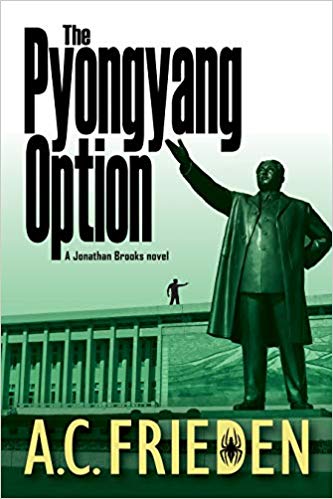The Pyongyang Option, by A. C. Frieden
spy/thriller
Summary:
Jonathan Brooks is a lawyer down on his luck. Hurricane Katrina (and the subsequent looting) has devastated his legal practice and his only option for work is to represent his remaining client, Cramer Banks, in business negotiations in Ukraine. A Ukrainian business wants to buy Bank’s newly-developed, lucrative technology. No sooner has Jonathan arrived in Ukraine, though, than things go awry. Bank’s technical operator, Kevin Wyatt, doesn’t arrive at the meetings with Jonathan and the Ukrainian business owner. The business owner is the shady type: mean, powerful, and relentless. But could he have something to do with Kevin’s disappearance? The embassy staff dismiss Jonathan’s concerns, but it’s soon clear that something has gone wrong. Jonathan, no stranger to dicey situations, begins investigating and uncovers a dangerous cyberterrorist cell with links to the most isolated, totalitarian country in the world: North Korea.
Meanwhile, the love of Jonathan’s life (and ex-wife) Linda is in China reporting on a summit on North Korean nuclear disarmament. When she gets the offer to report from Pyongyang on the same topic and interview a high North Korean official, she accepts. Soon she’s in Pyongyang, where one false move could end in deportation–or worse.
My thoughts:
Whew, I just finished the book and I’m still reeling.
All of you who adore spy thrillers, this is for you.
All of you who love lawyers-in-peril novels, this is for you. (Is that a genre? It should be.)
For all of you who yawn at the CIA and roll your eyes at lawyers, this book is for you, too. I dare you to read only one page. You won’t be able to.
This is the 3rd book in the series but it works as a standalone. Also, there’s a 4th book coming out soon. (Does Frieden have time to breathe? Seriously. Reading his bio makes me exhausted.)
The novel moves deftly across the globe. It moves from conference rooms in Ukraine, hurricane-devastated New Orleans, the basement of an abandoned elementary school in the Chernobyl Exclusion Zone, the picturesque Maldives, and others.
Most importantly, we experience North Korea. The isolation. The fear. The sense that everything is a façade, no one can trusted, and the regime’s real power is the constant threat of death. As Jonathan puts it,
“being alive in this hermit kingdom was a privilege, not a right” (p. 277)
Frieden has traveled to these locations, including North Korea (really!), and his research shows. He describes geography and circumstances in ways that only someone who’s experienced them first hand could. But he doesn’t allow the research to overwhelm the story. Everything propels the story forward.
Both Jonathan and Linda, as lead characters, are appealing. Jonathan is resourceful, stubborn, quick-witted and has a dry sense of humor. (Some of the banter between he and foreign officials is sharp-edged but humorous.) He longs to reunite with Linda. I could feel his despair, weariness, and grief over losing her.
Linda is also resourceful and tough. Now that she’s recovering from addiction, Linda’s career as a journalist has reignited. I sensed that she wants to reunite with her ex, but wants to be stronger before taking that step.
Other characters are equally well-developed. One person surprised me with a sudden (but not unrealistic) change of heart that made him sympathetic.
Probably my only complaints are a few typos. Also, though there are helpful maps at the beginning of the novel, I was reading on a PDF file and it was difficult to refer back to those maps when necessary. I have no idea if this is an issue with e-readers, as I don’t have one. It’s a non-issue with hard copies.
One of the characters calls himself a “magician,” but the real magician is A.C. Frieden for writing an addictive, devastating, roller-coaster ride of a novel that kept me turning pages–even when I had a migraine. I had to find out what happens to Jonathan Brooks and Linda Fabre Brooks.
When I did, I clicked out of the downloaded file on my phone and stared at the black screen for a long time. Speechless. Silent. I felt a bit like I had just escaped danger and would need a long time to process what happened.
Buy the book!
Buy The PyongYang Option on Amazon. It’s also available on Nook and Down and Out Books.
Connect with A. C. Frieden at his website or on Twitter @acfrieden. He’s on every imaginable social media channel (see his site for details).
Also, while you’re at his site, check out his page on his research and travels. It’s fascinating! http://www.acfrieden.com/globetrotting.html
I was fortunate enough to get an advanced reader’s copy. I didn’t have to give a good review . . . but I did because it deserved it.
Bonus tips for writers:
Use multiple POVs to your best advantage:
Right off the top of my head, there’s at least 8 point of view characters, probably more, all coming from different backgrounds, circumstances, and locations. This could be a jumbled mess. It’s not. Often in novels with this many characters, I think, Who the heck is this person? and have to flip back through the pages to figure out who is whom. I didn’t have to do that here. Why? Because Frieden creates vivid characters.
Here’s the thing. We’re all the star of our own lives, right? For the minor character, he/she IS the lead character. Minor characters have their goals and desires and conflicts, just like the major ones do. So make sure those are clear.
But those goals/conflicts need to work with the story, not in addition to the story. The individual goals/desires/conflicts need to add something substantial to the overall story. This helps make those minor POV characters memorable.
Also, multiple POVs lends itself to dramatic irony.
There’s plenty of that in this novel! One character suspects someone else is lying (when he/she is telling the truth) and doesn’t suspect another person (when he/she is lying). It’s deliciously ironic, often fun, and increases tension in the already-tense plot. It pits characters against one another when they’re on the same “side.” Or, on the flip side, it creates false alliances that turn deadly.
I mentioned Frieden’s extensive research. Here’s my second tip:
Let the research inform the story, not overwhelm it.
I’m sure you’ve read books like this: the novelist has researched their subject thoroughly and included everything in the novel. Every. Little. Thing. Including things that are undoubtedly fascinating but irrelevant to the story. (My eyes glaze over just thinking of one long-ago culprit.) What’s it do? Slows down the story. Don’t do this. Please. Put the cut material in a non-fiction book or article or blog post or your journal, but please, please, keep the story moving forward. (End of rant.)

